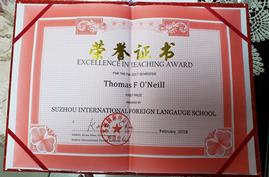When I first arrived in China, I quickly noticed that American humor is quite difficult for many Chinese people to understand. Culturally speaking, what is humorous in one culture may not be entirely understood in others. One reason for that is most humor is language-based; it’s a play on words and meanings.
Physical humor, on the other hand, is universal, and comic actors like Rowan Atkinson are very popular here in China. The Chinese, especially children, love watching short movie clips of Rowan Atkinson playing Mr. Bean.
For me personally, I found out quickly from teaching here that I lack the proficient language ability to tell a good joke in Chinese. When I try to tell jokes to my Chinese students, I’m told that I don’t have the right verbal cues that a Chinese person would use to make the jokes hilariously funny. My students do say, however, that I look funny when attempting to tell a joke in Chinese.
I found out also that young kids are the same everywhere and playing is necessary for them to build social skills. I like to give little kids a deferent perspective on the world by picking them up and holding them upside-down — that can be rather humorous for them and me.
In the 1960s, comedy teams in America such as Rowan and Martin used the politics of their day to bring in the laughs, but here in China political humor was banned after 1949. Modern times and modern politics have altered what can be funny in China. The humor here can be rather vanilla; the opposite of political satire.
I have learned also that after 1949 comedians in China had to clean up their humor. They had to get rid of country bumpkin jokes because the peasants were the heroes of the Chinese revolution. Of course, all the sex and bawdiness were gone, too.
The Chinese love posting political satire on the Internet, where they can remain anonymous from the Internet police. Old clips of Jon Stewart jokes are translated into Chinese and they are extremely popular here, but they are still a long way off from gracing Chinese primetime. His jokes are far too politically sensitive.
A major source of Internet satire in China is aimed at North Korea. In April of last year, a clip of a Jon Stewart joke about North Korea went viral in China. Turns out jokes about North Korea are funny to both Chinese and American audiences.
The topics at the Chinese comedy clubs are rather tame, nothing to bawdy or political and I suppose that is a major reason I prefer American humor over Chinese humor. One thing I found interesting though, in most of the improvisational comedy clubs, the Chinese players do not want to be videotaped or recorded due to fear the videos or recordings will be posted online.
I like to tell my Chinese students that in America when it comes to political satire, such fear as to what we say or how we say it is unnecessary. We have our freedom of expression and that is something most entertainers in China envy about us Americans.
The Chinese have a saying — laughter is the shortest distance between people — and that saying is profoundly true in any culture.
Humor has always been a perfect art form for connecting with others and I try to make the best of it in my classes.
- Always with love from Suzhou, China
Thomas F O’Neill
- Phone: (410) 925-9334
- WeChat: Thomas_F_ONeill
- Skype: Thomas_F_ONeill
- Email: introspective7@hotmail.com
- Facebook: http://facebook.com/thomasf.oneill.3/
Click on author's byline for bio and list of other works published by Pencil Stubs Online.







No comments:
Post a Comment